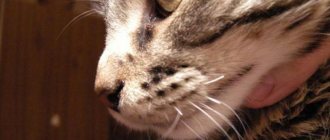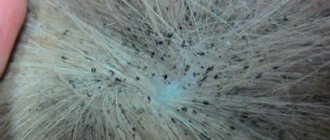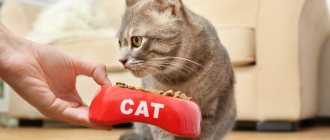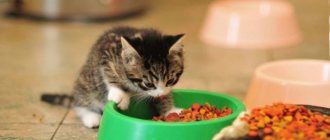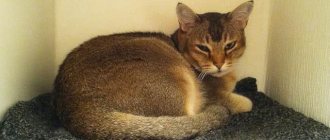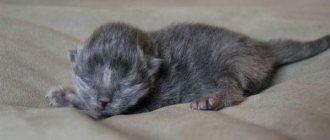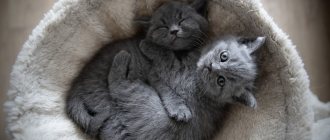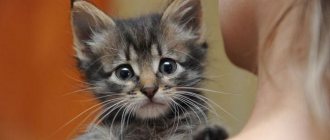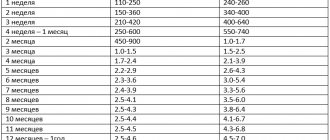Signs of bloating
If the pet has just eaten, then the rounded shape is quite normal. But if a kitten’s stomach is constantly bloated, regardless of food intake, this should alert the owner. In most cases, this condition is accompanied by additional symptoms.
- Urge to vomit. One-time ones most likely indicate overeating, but if the process is systematically repeated, then it could be poisoning or an infectious disease.
- Diarrhea. It can occur along with vomiting or as an independent phenomenon. Indicates poor nutrition, the presence of parasites, and intestinal infection.
- Weight loss. Despite the fact that the pet is losing weight, the belly remains inflated.
Little belly
- Inflammation of the oral mucosa , gingivitis. They signal the presence of disturbances in the gastrointestinal tract. Most likely, harmful substances have entered the stomach, causing irritation of the stomach walls and pain.
- Presence of helminth remains in excrement. The body is heavily infested with parasites. This condition is especially dangerous for small kittens, since the toxic waste products of worms quickly poison the body.
- Perverted food preferences. If the diet lacks vitamins and essential microelements, the pet may become interested and try to eat inedible or poorly digestible foods.
- Flatulence. A very common symptom. The animal is worried, rushing about, and cannot find a place for itself.
- Profuse drooling.
- Sometimes lethargy and decreased activity appear.
If, along with the fact that the kitten has a large tummy, it exhibits one or more of the listed signs, then the cause of the bloating can be determined from them.
Symptoms accompanying a bloated stomach
In each individual case, a kitten’s swollen tummy can be observed after a heavy dinner, when from the outside it seems that the baby is about to burst. Sometimes the situation is exactly the opposite - the kitten has eaten practically nothing, and the stomach looks like an inflated balloon.
Often, bloating in a kitten can be accompanied by additional symptoms. These include :
- Gagging
- Diarrhea
- Perverted preferences in appetites
- Inflammatory processes in the oral cavity
Vomiting symptoms most often accompany overeating. Vomiting clears the digestive tract of foreign objects. Most often it is disposable.
The cause of diarrhea may be an incorrect diet. However, we should not forget that it can also accompany numerous parasitic infections.
When we talk about perverted appetite, we mean the kitten eating completely inedible foods, or foods that are difficult to digest. In addition, such addictions to non-standard food indicate a lack of microelements and vitamins.
Inflammation of the oral cavity indicates irritation of the digestive tract. As a rule, they occur when chemical compounds enter the stomach, causing tummy pain in the kitten.
If you notice an enlarged, bloated tummy on a new member of your family, you should not put off visiting a veterinarian. Since a delay of not only a month, but even one day can not only seriously undermine his health, but also lead to the death of the animal.
Source
Why did the kitten have a big belly?
In a normal state, a healthy baby's tummy should be soft, of medium size, slightly larger after eating, and smaller after emptying. There are many reasons why a kitten has a big belly. Some of them do not pose a threat to health and are easily corrected by changing diet, while others require immediate assistance from a specialist.
- Incorrectly formulated diet , unsuitable food. The food kittens eat should be different from what they feed adult animals. The transition to adult food should occur gradually, starting with semi-liquid soft food. The baby’s stomach is not yet able to properly digest rough food, hence increased gas formation and bloating.
- Binge eating . Young kittens do not yet recognize the feeling of fullness and cannot stop eating in time. Therefore, control over the amount eaten falls entirely on the owner. It is advisable to feed your pet several times a day, giving small portions. A large amount of food eaten at a time stretches the walls of the stomach. If this happens regularly, the size of the stomach increases and it begins to bulge. Over time, obesity develops, which negatively affects the condition of other internal organs.
- I love to eat!..
- Constipation. It develops due to overeating and eating rough food that is not completely digested. Solid stool accumulates in the intestines, which is accompanied by pain and bulging of the abdomen.
- Presence of worms . Actively reproducing parasites take up more and more space in the stomach and intestines. Hence the big belly of the kitten, which is thin and continues to lose weight due to intoxication.
A bloated stomach can be caused by serious internal pathologies:
- liver dysfunction;
- enlargement of one of the organs located in the abdominal cavity (liver, spleen, kidneys);
- cystitis;
- peritonitis;
- abdominal dropsy (ascites).
Fading kitten syndrome
Typically, low birth weight is caused by malnutrition in the womb. If all kittens lag behind in development, this is most likely due to poor feeding of the cat. If only one or two kittens in the litter are smaller than the others, then it is most likely due to placental insufficiency, incomplete abruption or unfavorable attachment to the uterus. Kittens in this case are physically underdeveloped due to disruption of intrauterine development, and not due to age. These kittens are artificially fed and raised in an incubator.
Between 5 and 12 weeks of age, kittens are most susceptible to infections, particularly viral pneumonia. This is due to a decrease in passive (colostral) immunity and the absence of its own immune mechanism, including the absence of active post-vaccination immunity. If a cat has suffered viral or infectious diseases, then the kittens can become infected in utero. In this case, they are also born small and weak. Their condition worsens and they die within the first few days.
The maternal factor is very important for the survival of kittens. Primiparous and obese cats lose more kittens after birth than experienced cats in good physical condition. The quantity and quality of a cat's milk are extremely important. Mother's milk can be toxic to kittens for a number of reasons. The primary cause is acute septic mastitis, inflammation of the mammary glands or abscesses (more details).
Toxins in milk cause digestive upset in suckling kittens. This condition can also be caused by improperly prepared and stored infant formula. Toxic milk syndrome usually occurs in kittens one to two weeks old. The kittens are exhausted and constantly meow pitifully.
The most common symptoms are diarrhea and bloating. The anus is often red and swollen due to acidic stool. A complication of this syndrome is kitten septicemia (blood poisoning). Kittens with bloat are weaned and treated for diarrhea and dehydration (see Common Feeding Mistakes). Cooled kittens are warmed and placed in an incubator. They are fed artificially. Call a veterinarian immediately.
Hypogalactia is the most common cause of death in kittens. The number of kittens in the litter and genetic factors also play a big role, but in most cases mortality is associated with low caloric content and lack of nutrients in the cat's milk. Unfortunately, there are many other malformations of kittens that can lead to their death.
What do we have to do?
Ways to cope with bloating directly depend on the reasons that caused the painful condition.
If disorders are caused by poor nutrition, you must:
- adjust the diet;
- choose age-appropriate food;
- Make sure your kitten drinks more clean water;
- stimulate activity by playing with the animal more often.
The following methods are effective for constipation:
- abdominal massage (clockwise, with gentle movements without pressure);
- Add a few drops of Vaseline oil to food 2-3 times a day;
- in advanced cases, an enema is given;
- If the kitten is prone to constipation, he should be given fermented milk products from time to time.
Milk
For helminthic infestations, anthelmintic drugs are used.
When can you not do without a doctor?
If there is any suspicion of health problems, it is advisable to take the kitten to the veterinarian. But there are symptoms in which this must be done without delay.
If, in addition to a swollen belly, the kitten has:
- weakness, apathy;
- refusal to eat;
- increased body temperature;
- vomit;
- repeated diarrhea.
The combination of these signs means there is a high probability that the pet has inflammation of the abdominal cavity (infectious peritonitis), accompanied by bloody discharge or an outpouring of pus.
If the kitten is thin and the belly sticks out a lot, you can do the following - lift the animal, holding it under the front paws and look at the belly. If the bulge falls off, taking the shape of a pear, and returns to its place after the kitten is put on its feet, most likely fluid has accumulated in the abdominal cavity. This disease is called ascites.
Both peritonitis and ascites threaten not only the health, but also the life of the pet. Therefore, you cannot do without an urgent visit to the doctor.
Causes of bloating
The culprits of a bloated belly are overeating, flatulence, constipation and other factors in the life of a pet. Let's talk about each in more detail.
Poor nutrition
Kittens are like newborn babies. They need special nutrition that will be well digested. It is not recommended to feed 3-month-old animals food for adult cats. The stomach is not able to digest it. Food accumulates inside and the tummy swells. Problems with bowel movements, flatulence, and vitamin deficiency begin.
Constipation
If the belly is hard, dense, and the kitten squeaks when it tries to empty its bowels, then the cause of the bloating is constipation. It is easy to eliminate it - use laxatives, massage the abdomen in a circular motion with light pressure, give kefir and sour cream. Accumulations of feces can cause intoxication.
To get rid of hard feces, adjust your diet and diet. Introduce liquid food, milk, and vegetables to your pet’s menu. Do not feed fatty meat or dry food.
ATTENTION! If the kitten has not pooped for 3 days, give an enema with soapy water and oil.
Binge eating
Usually small animals are very voracious and active. They need energy for growth, development of bones and muscles. Sedentary kittens that consume a lot of food are at risk for obesity. Make portions rationally, play with your pet, make him move more, and the round belly will go away.
Worms
ATTENTION! You need to cleanse the intestines of helminths 2 times a year. Even animals that don’t go outside can get parasites.
Worms are dangerous for the general somatic health of animals. Ignoring the problem in rare cases leads to the death of the pet. Antiparasitic drugs are prescribed by a veterinarian. You cannot treat your baby on your own, because you need to know the dosage of drops, tablets, and treatment regimen.
You can spot helminths by examining your pet's stool and observing its behavior. If your baby is worried about bowel movements, his anus is itchy, or there are dead parasite larvae in his feces, then you need to go to the vet urgently.
Flatulence
Increased gas formation goes away on its own as the kitten grows. Flatulence in young cats is a common phenomenon associated with the beginning of adult complementary foods and imperfect functioning of the digestive system. The tummy is inflated and hard when there is gas, but after bowel movements it becomes soft and relaxed.
Activated carbon helps get rid of flatulence. Dilute the tablet with water and give your pet a drink. Use Enterosgel syrup, Espumisan.
Adjust your diet by excluding fish, grains, seasonings, and do not feed the animal from the common table. The source of gases are carbohydrates, and wild cats cannot receive them; the stomach is configured for plant and meat foods.
IMPORTANT! You can check for the presence of gases in the intestines as follows: lightly tap the kitten’s tummy; if you hear an empty sound like a drum, then the cause of the bloating is definitely flatulence or colic.
Malfunctions of internal organs
It is impossible to identify serious illnesses without medical help. See your doctor to understand why your kitten's tummy is swollen and what to do about it. The veterinarian will be able to make a diagnosis based on the results of examination, palpation, and tests.
The most common causes of bloated intestines are the following diseases:
- Obesity.
- Peritonitis.
- Gastrointestinal tract tumors.
- Cirrhosis.
Peritonitis (ascites) is considered especially dangerous. At the same time, the belly and sides are inflated, and the kitten itself is thin. The cause of peritonitis is an infection transmitted through saliva, feces, during childbirth from an adult cat to a newborn, during the placental period.
Fluid accumulates in the pet’s abdominal cavity; surgical intervention will be required to remove it and normalize the functioning of the internal organs. You can verify ascites by performing the following manipulations with the animal:
- Take the kitten in your hands and lift it up.
- Hold vertically for 10-15 seconds. Assess the shape of your belly.
- Lower the animal down and look at the stomach.
- If at the top the tummy looked like a pear, at the bottom it became spherical again, then the presence of peritonitis is unambiguous.
- Contact your doctor for help immediately.
Bloating in an adult cat
In adult pets and kittens, the causes of bloating are often the same. Poor nutrition may also be to blame here, especially a common situation when the diet of an adult animal contains a lot of dairy products, which become less and less absorbed by the body with age. So, if your cat has a bloated belly, he may have just drunk some milk.
Pukhlyash
Another possible reason is excess weight. Because of this, the pet has constant digestive problems and gas accumulation.
In cats, bulging can be caused by an enlarged uterus during pregnancy.
If the cat is not pregnant, but has a large belly, then the pet may have a serious illness - purulent inflammation of the uterus (pyometra). Over time, the uterus becomes so filled with purulent masses that it begins to bulge noticeably. The disease is treated exclusively by surgery - the uterus is removed. The sooner the diagnosis is made and surgery is performed, the greater the chance that the animal will fully recover.
Benign or malignant formations in the abdominal organs as they grow cause not only an increase in the volume of the abdomen, but also its obvious asymmetry. Tumors often affect older animals.
Diseases that cause bloating
A swollen, hard tummy occurs in pets due to various diseases. Diagnosis should be carried out by a doctor, but it doesn’t hurt to know the characteristic symptoms.
Liver failure
If a one-month-old kitten has a hard and bloated tummy, you should think about liver problems. It could be hepatitis or cirrhosis. The disease can be identified by yellowing of the whites of the eyes, a regular increase in body temperature and loss of appetite. With cirrhosis of the liver, an animal experiences diarrhea, vomiting, flatulence and loss of appetite. In such cases, the abdominal cavity swells and hurts.
What to do?
The best thing to do if your cat has a swollen belly is to contact a veterinarian. Only a doctor, after examination and testing, will be able to make the correct diagnosis and prescribe treatment.
But if your pet generally feels fine and there are no aggravating symptoms, then you can try to alleviate his condition:
- exclude gas-forming products from the menu;
- restore the balance of intestinal microflora with Hilak Forte (you can also use Lactobacterin, Espumisan or Acipol);
- Smecta or Enterosgel will help normalize the gastrointestinal tract.
Many diseases accompanied by bloating are treated only with surgery. Delay can cost your pet's life.
